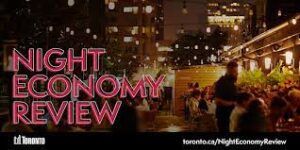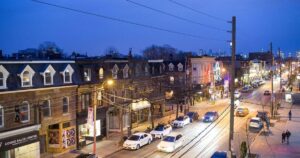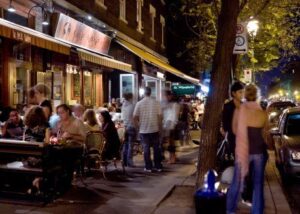
The Night Time Economy program has passed its first stage and goes for a vote before City Council this month.
A plan to make New Toronto a Night Time Economy area in which clubs will remain open for longer hours is getting closer to becoming a reality.
The motion was approved by a Planning and Housing Committee meeting on November 29 and will now be considered by City Council on December 13 and 14.
Residents from Long Branch and the Dundas Strip, where the changes will take effect, are concerned about increased noise, crime and drunken behavior from the late night clubs.
A staffer from Ward 3 Councillor Amber Morley’s office said the proposed changes are the result of the Night Economy Review.
Morley’s Chief of Staff Lisa Brody Hoffman wrote the City initiative will support and enhance the Night Economy in Toronto by modernizing the city’s zoning, licensing and regulation for businesses such as restaurants, bars, and entertainment venues operating at night.
Hoffman wrote in an e-mail the by-laws regulating this industry create confusion for both businesses and by-law enforcement.

Long Branch and the Dundas Street strip in South Etobicoke will be part of the Night Time Economy program if approved.
“The existing by-laws are a patchwork assembly from pre-amalgamation municipalities,” Hoffman said. “Many of the bylaws for modernization are out of date, originally put in place in the 1980s or earlier.”
The new framework proposes licensing and zoning regulations that are clear, standardized, enforceable, and better reflect the nightlife in Toronto, she said.
The changes reflect feedback from restaurants and bars, Business Improvement Areas (BIAs), artists and producers, music venues, residents’ associations, and residents who took part in consultations that has been underway since 2018.

If approved, the program will allow bars and nighclubs to open to 4 a.m. with a special permit which residents are concerned about.
“The most frequent concerns we have heard from residents are about the changes which will allow nightclubs to open outside of downtown Toronto, and how that may affect their neighbourhood,” she said.
If approved, nightclubs will be allowed in mixed-use residential areas and only be permitted in non-residential buildings. If a building contains a single residential unit, a nightclub cannot operate there.
The clubs must be located on the ground level; located within 6.1 meters of a residential zoned area and will be restricted in size. To prevent bunching, a maximum of only one nightclub is allowed in a building and a strip mall cannot contain multiple venues licensed as nightclubs.

Long Branch residents are concerned the longer hours for bars will lead to more noise, crime and drunken behaviour.
A licensing requirement that requires the submission and compliance with a “Level 2 Noise Control Plan” will involve review by sound engineers and City staff.
“Much of Lakeshore Boulevard would not be eligible as they are storefronts with residential buildings on top,” she wrote.
Hoffman said venues will be approved to be open until the standard 2 a.m. and require a special permit to remain open until 4 a.m.
“A different permit application must be submitted, reviewed, and approved for each instance where a venue stays open later than the standard 2 a.m. close time,” Hoffman said.
If the item is approved by City Council later this month, City staff will host in-person and virtual Town Hall meetings in January 2024, and the by-laws will take effect by January 1, 2025.

